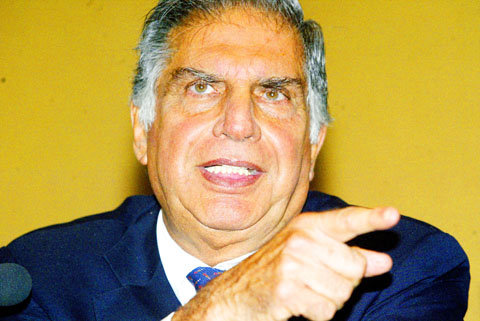Police yesterday surrounded the Indian plant scheduled to produce the world’s cheapest car as activists prepared for a siege protest aimed at forcing Tata Motors to return the site to local farmers.
At least 200,000 people were expected to join the protest in Singur, 35km northwest of the state capital Kolkata, activists said.
“Security has been tightened in and around Tata’s small car project. More than 4,000 policemen have been deployed,” said Raj Kanojia, police chief of West Bengal state, where Singur is located.

PHOTO: AFP
The gates of factory, which is still under construction, have been fenced off, Kanojia said, as concern mounted over an October deadline for the first of the US$2,500 Nano cars to be produced.
On Friday, Tata Group chairman Ratan Tata, whose Tata Motors is India’s top vehicle-maker, warned he would move the plant out of the state if the demonstrations kept up, although his company has invested US$350 million in the project.
Indian states vied at the weekend to offer alternative sites.
Prosperous Punjab invited Tata to make the northern state its home for manufacturing the Nano, promising “all possible facilities” for the mini-car.
Maharashtra Chief Minister Vilasrao Deshmukh pledged a “red carpet welcome” in the wealthy state, while poverty-hit Orissa state offered “all kinds of support.”
Activists at Singur say they will only call off protests if the government hands back 160 hectares forcibly taken from farmers, who have not accepted any compensation.
But West Bengal Chief Minister Buddhadeb Bhattacharjee, whose communist-controlled government wooed the project, insisted that the row would be settled.
“I’d like to assert the project will be a reality,” Bhattacharjee said late on Saturday. “Nobody can obstruct it.”
Tensions were high yesterday across West Bengal, which has often been at the forefront of recent battles over land rights in India.
The struggles have pitted the interests of farmers who say they will starve without their land against those of business and India’s government, which say the country needs to industrialize rapidly.
For more than two years, the Tata factory site has seen protests by activists and villagers who say many farmers were forced to part with their land.
At Nandigram village, where the state government acquired land for a petrochemical hub, police in March last year shot dead 14 farmers opposing the move.

MORE VISITORS: The Tourism Administration said that it is seeing positive prospects in its efforts to expand the tourism market in North America and Europe Taiwan has been ranked as the cheapest place in the world to travel to this year, based on a list recommended by NerdWallet. The San Francisco-based personal finance company said that Taiwan topped the list of 16 nations it chose for budget travelers because US tourists do not need visas and travelers can easily have a good meal for less than US$10. A bus ride in Taipei costs just under US$0.50, while subway rides start at US$0.60, the firm said, adding that public transportation in Taiwan is easy to navigate. The firm also called Taiwan a “food lover’s paradise,” citing inexpensive breakfast stalls

TRADE: A mandatory declaration of origin for manufactured goods bound for the US is to take effect on May 7 to block China from exploiting Taiwan’s trade channels All products manufactured in Taiwan and exported to the US must include a signed declaration of origin starting on May 7, the Bureau of Foreign Trade announced yesterday. US President Donald Trump on April 2 imposed a 32 percent tariff on imports from Taiwan, but one week later announced a 90-day pause on its implementation. However, a universal 10 percent tariff was immediately applied to most imports from around the world. On April 12, the Trump administration further exempted computers, smartphones and semiconductors from the new tariffs. In response, President William Lai’s (賴清德) administration has introduced a series of countermeasures to support affected

CROSS-STRAIT: The vast majority of Taiwanese support maintaining the ‘status quo,’ while concern is rising about Beijing’s influence operations More than eight out of 10 Taiwanese reject Beijing’s “one country, two systems” framework for cross-strait relations, according to a survey released by the Mainland Affairs Council (MAC) on Thursday. The MAC’s latest quarterly survey found that 84.4 percent of respondents opposed Beijing’s “one country, two systems” formula for handling cross-strait relations — a figure consistent with past polling. Over the past three years, opposition to the framework has remained high, ranging from a low of 83.6 percent in April 2023 to a peak of 89.6 percent in April last year. In the most recent poll, 82.5 percent also rejected China’s

PLUGGING HOLES: The amendments would bring the legislation in line with systems found in other countries such as Japan and the US, Legislator Chen Kuan-ting said Democratic Progressive Party (DPP) Legislator Chen Kuan-ting (陳冠廷) has proposed amending national security legislation amid a spate of espionage cases. Potential gaps in security vetting procedures for personnel with access to sensitive information prompted him to propose the amendments, which would introduce changes to Article 14 of the Classified National Security Information Protection Act (國家機密保護法), Chen said yesterday. The proposal, which aims to enhance interagency vetting procedures and reduce the risk of classified information leaks, would establish a comprehensive security clearance system in Taiwan, he said. The amendment would require character and loyalty checks for civil servants and intelligence personnel prior to